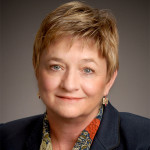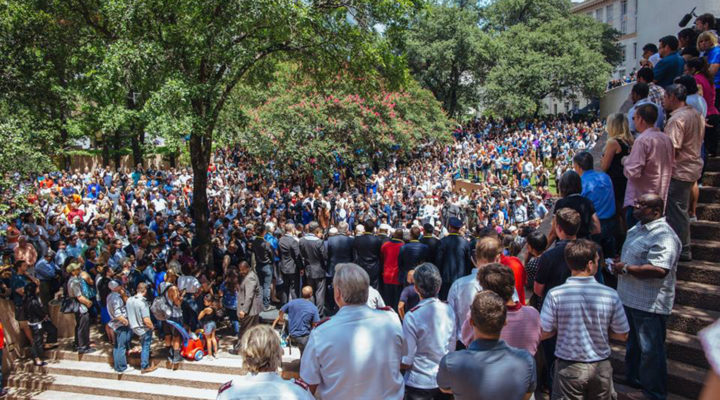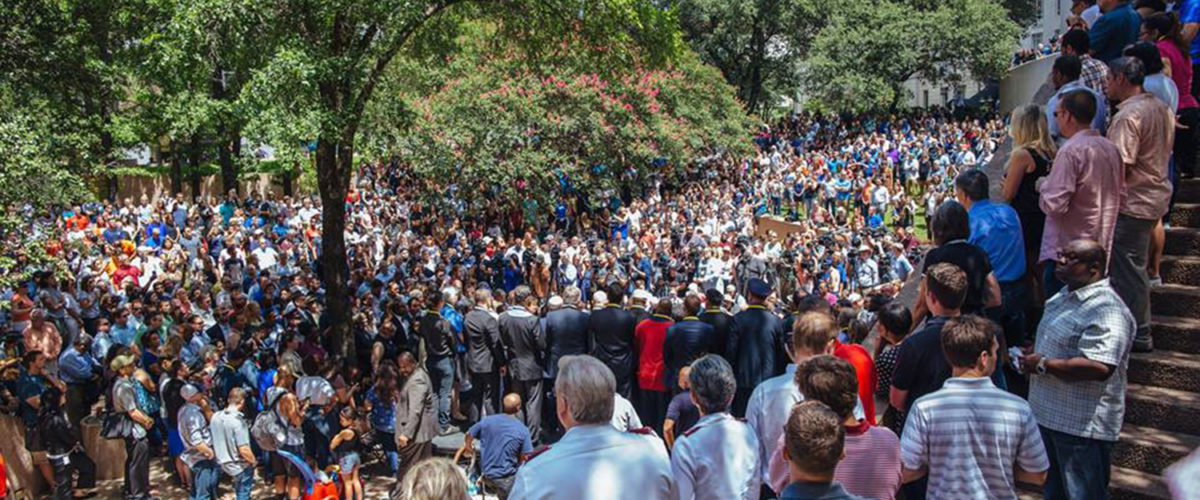Because words, tears and prayers are not enough to salve the racial wounds ripped bare this week with police shootings in Louisiana and Minnesota and the killing of five police officers in Dallas July 7, Baptists around the country are calling for action — personal and corporate — to promote healing.
In Dallas, a diverse group of local church leaders held a Together We Stand prayer service July 8 at the Legacy Center of Concord Church.

George Mason
George Mason, pastor of another Dallas congregation, Wilshire Baptist Church, led an interfaith clergy prayer service the same day at Thanks-Giving Square in the city’s downtown at noon and opened the church parlor to host counselors to comfort and pray with those who are grieving.
“The church is a first responder,” Mason said in a Facebook post. “We will be careful with our words. We will lead laments and mourning before we find fault or fix blame.”
Mason said that Christians gather to console, lament and pray “because every act of coming together is another stitch in the torn fabric of our community.”
Wilshire, already in a working relationship with New Baptist Covenant partner Friendship West Baptist Church in Dallas, will nurture more such partnerships toward racial reconciliation, Mason said, adding that he and Friendship West pastor Freddy Haynes will work together “to determine how to practice the peace of Christ in this moment and beyond.”
“Today,” he encouraged his readers, “we can begin by showing up and praying up.”
The New Baptist Covenant, which owes its birth to efforts inspired by President Jimmy Carter for racial reconciliation, distributed a “litany for a mourning people” for use on Sunday morning.

Elijah Zehyoue
“There is not a choice between standing with protestors or standing with police,” said Elijah Zehyoue, director of programs and communications for the NBC. “Violence anywhere and everywhere breaks the heart of God just as injustice anywhere is a threat to justice everywhere.”
After two black men were shot by white officers, Jeff Roberts, pastor of Trinity Baptist Church in Raleigh, N.C., spent July 7 reaching out to black pastors “who are my friends,” he said in a Facebook post July 8. On the day after the Dallas shooting, he reached out to police officers connected with his congregation.
“In both cases I had the same message,” he said. “I love you and support you and God is with you. We are all hurting.”
Roberts encouraged others to reach out, to “make that call or send that text. Let them know they are loved and supported and you are praying for them.”
“Ultimately that’s what is going to make the difference, reaching out to people we know and trying to support them,” he said in a later interview.
Cameron Jorgenson, associate professor of Christian theology and ethics at Campbell University Divinity School in Buie’s Creek, N.C., whose student population is about 40 percent black, had a simple message to all: You matter.
He drew parallels between police officers and Catholic priests who labor in their duties under a cloud of suspicion, the former because of perceived racism, the latter because of sex abuse scandals in the Catholic Church.
“In both cases good, even heroic, people have their difficult job made harder as they are presumed guilty by virtue of their profession,” he said. “The Christian tradition has a handful of words that are relevant to the crisis we’re in right now: repentance, reconciliation, love, resurrection. Rather than despair, today I’m forcing myself to think on these things. Lord, have mercy.”

Suzzi Paynter
Suzii Paynter, executive coordinator of the Cooperative Baptist Fellowship, asked member congregations to pray for peace through justice in their communities.
“Out of love for God and neighbor, we are commanded to seek peace through justice,” she said in a posted message.
Because the church is a “convening place” she encouraged churches in every community to join with others to host community forums that include representatives of the community and law enforcement.
“Reach out to African-American churches in your town and be a partner congregation in convening the community. We know that dialogue and resolution at times can begin and flourish in a sanctuary beyond what we can achieve in the streets.”
Ironically, Dallas has a reputation of commitment to working on race relations, and of a police department strong on community policing and well trained in appropriate use of force.
It has entrenched community organizations like Unite Dallas and Dallas Faces Race and initiatives from City Hall. So Mason noted efforts in the immediate aftermath of the killings are not the first steps in deepening relationships.
“Dallas has already been highly at work in that regard,” he said. But no city is immune “when lunatics decide to exploit the moment.”
“No matter what we do to build all these trusts and work together in significant ways, it’s almost impossible to reach every deranged, angry and isolated individual and get them to do the right thing.”
A weary Mason added, “At some point we need to look at each other and say, “Damn, we’re trying. It’s terrible that it’s like this.”
Related content:
Texas minister leading Dallas protest pushes people to safety, using 10-ft cross
Black Christian leaders voice anger, lament over deaths of Alton Sterling and Philando Castile


